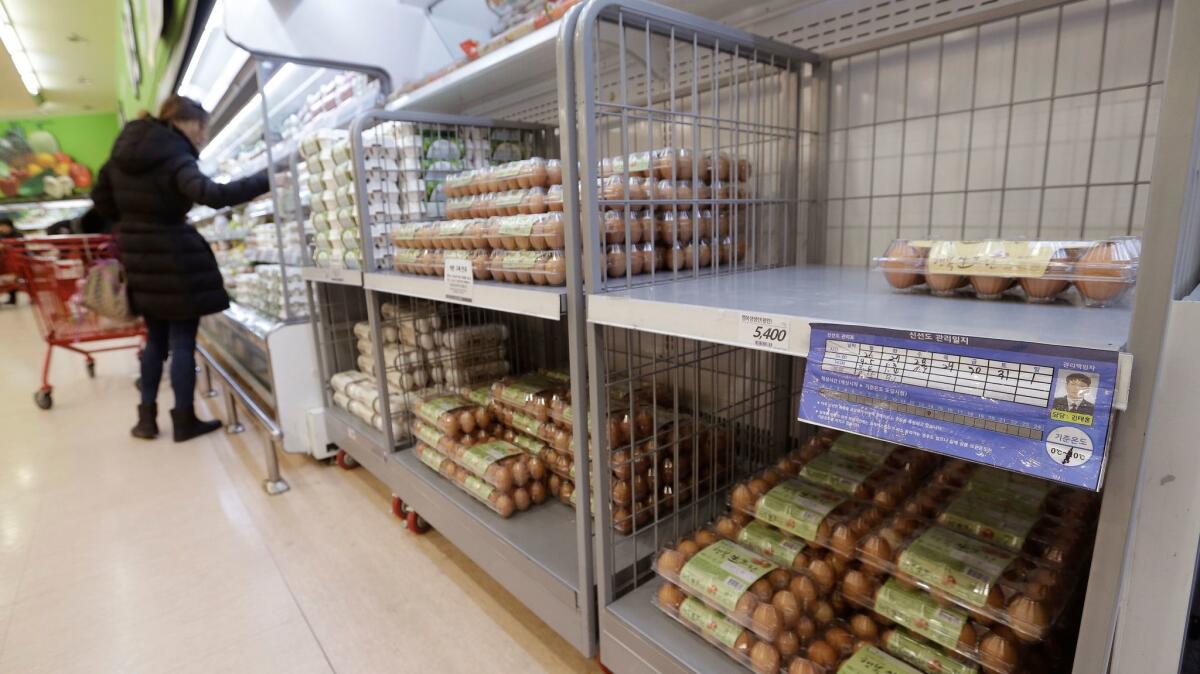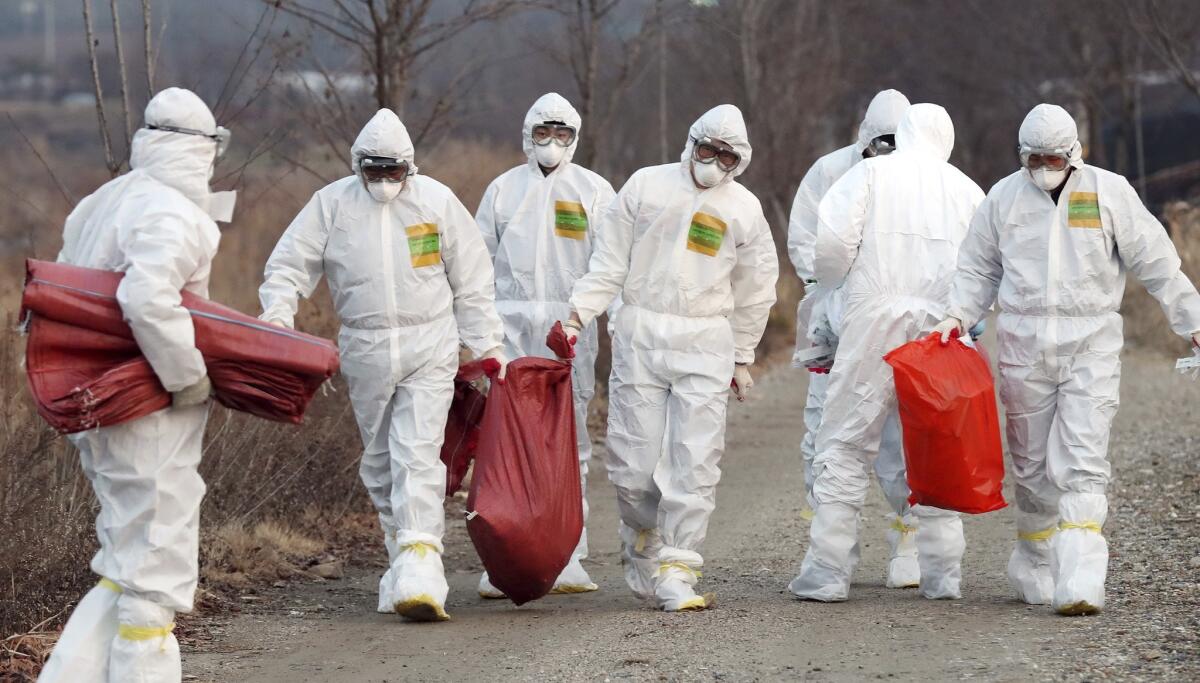South Korea is coping with its worst outbreak of avian flu ever — and U.S. egg farmers are benefiting

Reporting from Seoul — The first alarm about a potential avian flu infestation at the poultry farm came from suspicious workers at a nearby taxi company in late December.
Health workers showed up almost immediately. Confirming the worst, they ordered Yang Byeong-hak, a farmer in a southwestern province, to cull roughly 12,000 ducks within a day.
They were his entire stock.
Yang dug a massive hole, lined it with vinyl and chemicals and buried the dead birds. Then all the other poultry farmers in a 3-kilometer radius — his neighbors and colleagues in the industry — were forced to do the same, he said.
“People have looked at me disapprovingly, and at first I was sorry, but also angry and resentful,” said Yang, a poultry farmer for more than a decade in South Jeolla province. “I have wanted to blame someone.”
Yang has for now focused his disappointment toward the South Korean government, which is reacting aggressively to a highly pathogenic avian influenza strain that has devastated the poultry industry here.
The nation itself is in crisis right now, so we don’t expect much from the government.
— farmer Kang Eun-ju
Recognizing the crisis and its potential impact on consumers, South Korea has agreed to allow eggs to be imported from the United States, Australia and New Zealand. Other countries might soon be invited to help too. The government has reduced tariffs and agreed to subsidize part of the cost of shipment.
Last week, about 200 tons — millions of eggs — arrived from the United States in carefully packed boxes on commercial airlines, just in time for Lunar New Year, when South Korean families come together to celebrate with home-cooked meals.
The imported eggs are expected to be the first of many from the United States under a temporary agreement between the countries, which already have a trade deal that includes eggs known as the U.S. Korea Free Trade Agreement, or KORUS. President Trump has criticized it as a “job-killing deal.”
In this case, the Korean government has waived KORUS tariffs on eggs and agreed to subsidize part of the freight costs, making the prices profitable for importers and cheap enough for consumers.
South Korea is no stranger to avian influenza, but this year’s outbreak has been its worst, thanks in part to a new strain.
And the nation’s egg consumers have noticed. Bakeries in some cases have fewer eggs than needed, and large supermarkets have been limiting customers’ purchases. The shortage has driven up prices by as much as 50% on average since December, according to a study by local analysts with the U.S. Department of Agriculture.
By late December, at least 20 million birds — perhaps more than 10% of the country’s poultry stock of chickens and ducks — have been culled because of the flu. The figures continue to grow.

“The viruses before were not this severe,” said Kim Jae-hong with the Korean Poultry Assn. “The poultry farms were thoroughly disinfected but could not withstand the virus and are continuing to experience losses.”
The government has declared the situation “serious” — the highest alert on the country’s health scale, according to American agriculture officials, who are monitoring the situation closely.
In some cases, the South Korean government has stopped transportation of birds and poultry products to avoid spreading the virus, and its health workers have been granted the authority to direct disinfection at dozens of farms like Yang’s — even preemptively at locations near those with infections. The virus can be spread by infected poultry, but it can also be carried by clothing or equipment that has been near the birds.
Amid the reaction, the imported eggs, while welcomed by some consumers, are coming with a small catch. The American eggs being imported now have white shells. Since the 1970s, South Koreans have become accustomed to brown shells, which have been marketed as “native.” It remains to be seen whether consumers will trust the white-shelled variety.
South Korean farmers and their trade representatives aren’t enthusiastic about the program. They fear it undermines the local industry without reducing prices enough to justify the policy change.
According to the American agriculture report, a dozen imported eggs should cost about the same as average-grade South Korean ones did before the crisis — just under $2. The study found that a dozen local eggs cost about $1.87 in early December. A month later, the price had risen to $2.99.
Consumers have noticed the relatively bare shelves at major supermarkets — and, of course, the higher prices.
“The eggs became more expensive but it’s bearable,” said Kim Ok-nam, who lives in central Seoul and supports the American import plan. “Eggs probably won’t get much cheaper but I’ll be satisfied if the price stays the same.”
Another shopper, Kim Kyeong-sook, has also noticed the price changes, which vary somewhat by market. She said she prefers the prices at Costco, the American discount retailer, but the stores have restricted consumers to 30 eggs.
Koreans have dramatically increased their consumption of animal protein since the country’s economy was transformed in the latter half of the 20th century. Eggs are a key part of that. Annual per capita consumption last year was about 28 pounds, government data show — up 2 pounds per person since 2009.
Kim Kyeong-sook said she has no choice but to agree with the import plan — and pay a bit more.
“There are eggs in everything, like bread, so we just have to accept it,” she said. “The price probably won’t go down that much. The prices rose, but other than that, I don’t feel uncomfortable. I haven’t been affected too much.”
While consumers deal with higher prices, the poultry industry here is struggling with how to cope with the outbreak. It’s believed that the virus began in the southern part of the country, brought on by migratory birds. It spread quickly to some northern locations in a country that has an advanced transportation infrastructure.
The farmers are upset about the level of disaster compensation from government officials — and the idea of importing eggs to shore up the consumer markets has added to their frustration, in some cases, even for those who haven’t experienced losses.
“It’s a sensitive issue,” said Kang Eun-ju, a farm owner in Gyeongsang province.
Fortunately for her, Kang’s farm has been spared. But she’s still angered by media reports suggesting that unsterile or inhumane farm conditions helped spread the disease. And the festering controversy surrounding the South Korean president, recently impeached in an influence-peddling scandal, hasn’t given her confidence that the government is prepared to respond in the farmers’ favor.
“The nation itself is in crisis right now, so we don’t expect much from the government,” she said. “We’ll have to see how policy changes once we go through regime change.”
The politics in his country don’t concern Yang, the duck farmer in the southwest, as much as the process for getting his farm operational again. He’s received less government compensation than he feels he deserves — but he also faces the prospect of months of disinfecting without being able to rebuild his stock.
Hundreds of other poultry farmers across his province and the country now face the same fate, and perhaps the same concern.
“It’s very difficult for us right now,” he said, later asking, “Should I keep doing this work?”
Stiles is a special correspondent.
ALSO
In Asia, China looks like the winner after scuttling of Trans-Pacific Partnership
It’s a bird! It’s a plane! Therein lies the problem at Lebanon’s international airport











